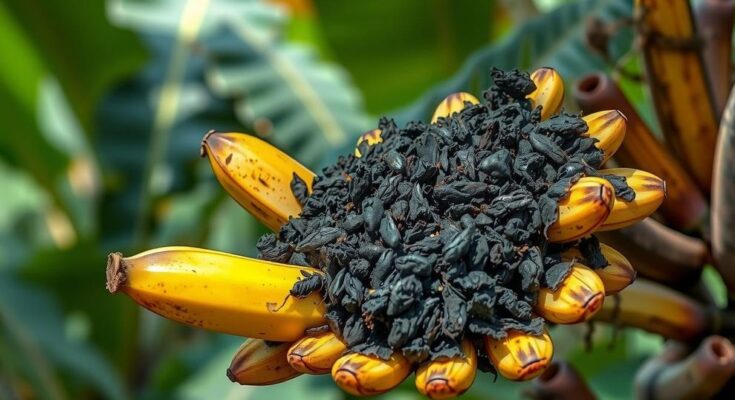In Cameroon, Steve Djeutchou is transforming banana peels into biochar to combat deforestation caused by traditional charcoal production. Despite producing three tons monthly, scaling up remains a challenge. Steve also runs a training school to enhance local skills in renewable energy, emphasizing the need for sustainable solutions amid the climate crisis.
In Yaoundé, Cameroon, an innovative approach to combat environmental degradation has emerged through the transformation of organic waste into ecological charcoal, known as biochar. Steve Djeutchou, a 30-year-old engineer, spearheads this initiative, capitalizing on the abundant supply of banana peels which he procures from local suppliers. Despite producing approximately three tons of biochar monthly, the impact remains limited due to insufficient resources for scaling production. Between 2002 and 2020, Cameroon suffered a loss of over 700,000 hectares of forest, primarily due to charcoal production, which emphasizes the urgency of alternatives.
Steve’s enterprise not only addresses deforestation but contributes to a sustainable economy by offering a viable substitute for traditional charcoal, which is notorious for its environmental impact. His biochar is more affordable and less harmful, costing 250 francs per kilogram as opposed to the 500 francs for conventional charcoal, and produces less smoke during combustion—benefits noted by users like Cindy, a local resident preparing meals for her family. Steve continues to develop his production methods, utilizing carbonizers he designed himself to enhance efficiency and quality.
In addition to biochar production, Steve has established a training school focused on renewable energy, aiming to equip individuals with skills in waste recovery and biomass utilization. Over the past four years, he has trained hundreds of people, promoting the idea that renewable energy is pivotal for climate change mitigation and local job creation. With an estimated 320,000 jobs in Africa’s renewable energy sector, Steve’s efforts contribute significantly to fostering human resources and instilling a vision for a sustainable future in Cameroon.
Overall, the combination of Steve’s entrepreneurial endeavors and educational initiatives illustrates a comprehensive approach to not only tackle deforestation but also to pave the way for a greener, more sustainable society. By nurturing local expertise and promoting renewable energy solutions, there is potential for significant societal transformation.
This article highlights the environmental challenges faced by Cameroon, particularly due to deforestation linked to charcoal production. With one of Africa’s largest forests, the ecological impact of traditional charcoal burning poses a significant threat. The initiative led by Steve Djeutchou reflects a growing movement towards sustainability, utilizing local organic waste such as banana peels to produce biochar—an alternative energy source that both protects forests and contributes to a circular economy. Furthermore, Steve’s educational outreach underscores the importance of skill development in renewable energy fields.
The efforts of Steve Djeutchou represent a vital contribution to combating deforestation in Cameroon through innovative biochar production. His transition from organic waste to ecological charcoal not only helps mitigate the environmental crisis associated with charcoal burning but also fosters local job creation through training in renewable energy. As the global climate emergency intensifies, initiatives like Steve’s are essential for promoting sustainability and developing a resilient economy.
Original Source: news.mongabay.com




